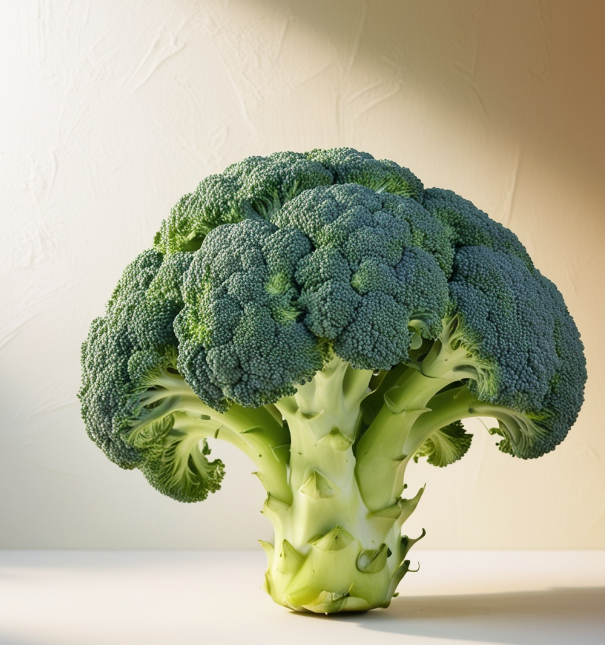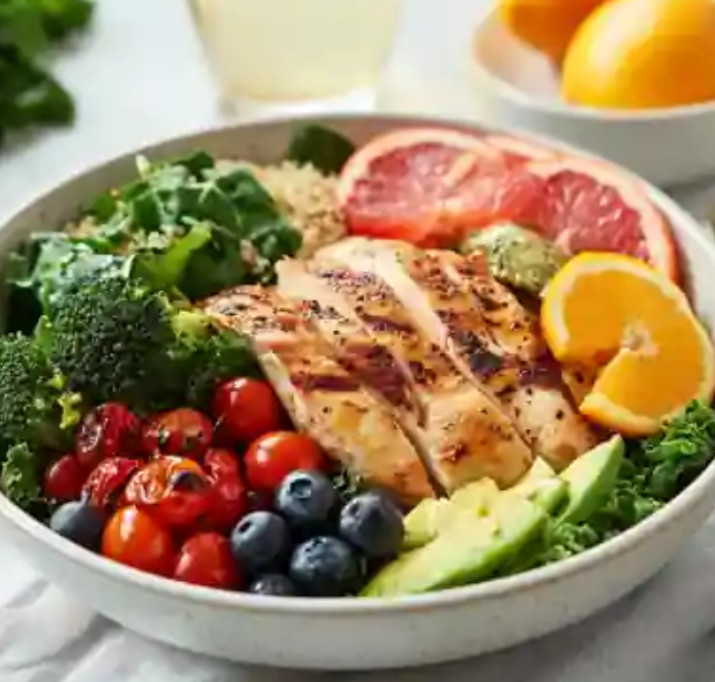Broccoli is often recognized for its many health benefits, especially when it comes to weight loss. Being low in calories and rich in fiber, it can help reduce appetite and support your weight loss journey. But can you lose weight if broccoli is the only thing on your plate? Let’s explore the nutritional profile of broccoli, its impact on weight loss, and whether eating only broccoli is a good idea.
Nutritional Profile of Broccoli
Broccoli is a nutrient-dense vegetable that provides essential vitamins and minerals with very few calories. Here’s what a typical serving offers:
- Calories: 55 (per 100g)
- Protein: 3.7g
- Fiber: 2.4g
- Carbohydrates: 11.2g
- Vitamins: A, C, K, folate
- Minerals: Calcium, iron, potassium
The high fiber content in broccoli helps with digestion and prolongs the feeling of fullness. However, while this makes broccoli an excellent food for weight management, relying solely on it may cause nutritional imbalances. To see a deeper dive into broccoli’s role in weight loss, check out this chicken and broccoli diet article.

How Eating Only Broccoli Affects Your Body
Low-Calorie Intake
Since broccoli is so low in calories, consuming only broccoli may result in a significant caloric deficit, which is essential for weight loss. However, sustaining such a low-calorie intake over time can lead to fatigue, low energy, and a slowed metabolism. In addition, relying exclusively on broccoli could leave you missing essential nutrients.
Nutrient Deficiencies
Although broccoli is rich in vitamins, it lacks essential macronutrients like protein and healthy fats. Without a balanced diet, you may experience deficiencies that affect everything from muscle function to hormone balance. To learn more about the risks of limiting your diet to only a few foods, explore this article on whether you can lose weight eating only chicken and broccoli.
Can You Lose Weight Eating Only Broccoli?
Yes, eating only broccoli can lead to weight loss because of the drastic reduction in calories. However, this extreme diet comes with several downsides:
- Caloric Deficit: You’ll experience a calorie deficit, but without sufficient energy from other foods, you might feel sluggish or fatigued.
- Fiber and Fullness: The fiber in broccoli will help keep you full, but this fullness can’t replace the energy provided by protein or fats.
- Muscle Loss: Without adequate protein, your body may start to break down muscle tissue, which can slow your metabolism and hinder long-term weight loss goals.
For more about sustainable weight loss approaches, visit the lose weight eating chicken and vegetables every day article.
The Importance of a Balanced Diet for Sustainable Weight Loss
While broccoli can be an excellent part of your weight loss strategy, eating it exclusively is not sustainable. A balanced diet that includes lean proteins, healthy fats, and other nutrient-rich vegetables ensures you get the nutrients your body needs to stay healthy.
Protein and Healthy Fats
Protein is crucial for maintaining muscle mass, while fats are needed for energy and hormone production. Adding lean meats, fish, or tofu to your meals will help you get enough protein and fats while still losing weight.
Carbohydrates for Energy
Contrary to popular belief, carbohydrates are essential for energy. Including complex carbs like sweet potatoes or quinoa alongside broccoli will help you feel energized and sustain your weight loss efforts.

Potential Health Risks of Eating Only Broccoli
Eating only broccoli can lead to several risks, including:
- Nutrient Deficiencies: Without protein and fats, you may suffer from a lack of essential nutrients needed for optimal health.
- Fatigue: Broccoli alone won’t provide enough calories or nutrients to maintain your energy levels, leaving you feeling tired.
- Digestive Issues: Too much fiber can lead to bloating and digestive discomfort if not balanced with other foods.
Alternatives to an All-Broccoli Diet
Rather than focusing solely on broccoli, consider adding variety to your diet with these alternatives:
- Other Vegetables: Including spinach, kale, and asparagus will add more nutrients and variety to your meals.
- Lean Proteins: Foods like chicken, salmon, or tofu provide the protein you need to maintain muscle mass.
- Healthy Fats: Adding avocados, nuts, or olive oil ensures you’re getting enough fats to support hormone function and energy.
FAQs
- Can you lose weight by only eating broccoli?
- Yes, because of its low calorie content, but it’s not a sustainable or healthy way to lose weight.
- How much weight can you lose with a broccoli-only diet?
- The amount of weight lost depends on your metabolism, but the risks associated with nutrient deficiencies outweigh any short-term benefits.
- Is it healthy to eat only broccoli?
- No, as it lacks the necessary proteins and fats your body needs to function properly.
- Can you combine broccoli with other foods for better results?
- Absolutely! Combining broccoli with lean proteins and healthy fats will create a balanced diet that supports long-term weight loss.
Conclusion
Broccoli is a nutrient-packed food that can aid in weight loss, but eating only broccoli is neither healthy nor sustainable. Instead, opt for a balanced diet that includes a variety of lean proteins, healthy fats, and other nutrient-rich vegetables. This approach will help you lose weight while keeping your body healthy and energized.
For more insights on weight loss and balanced eating, check out the articles on why bodybuilders eat chicken and broccoli and healthy ways to incorporate broccoli into your meals.

